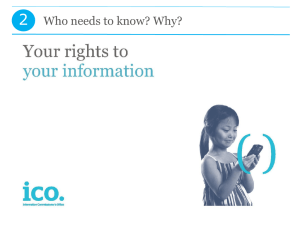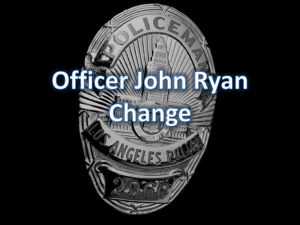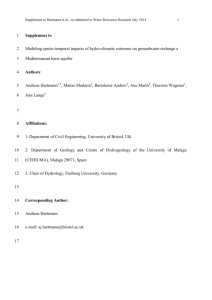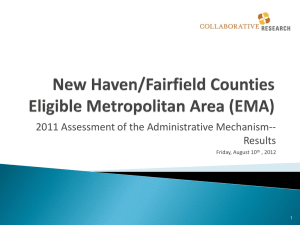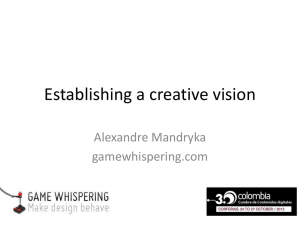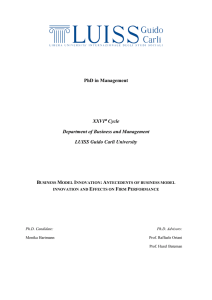Middle School Social Media for Parents
advertisement
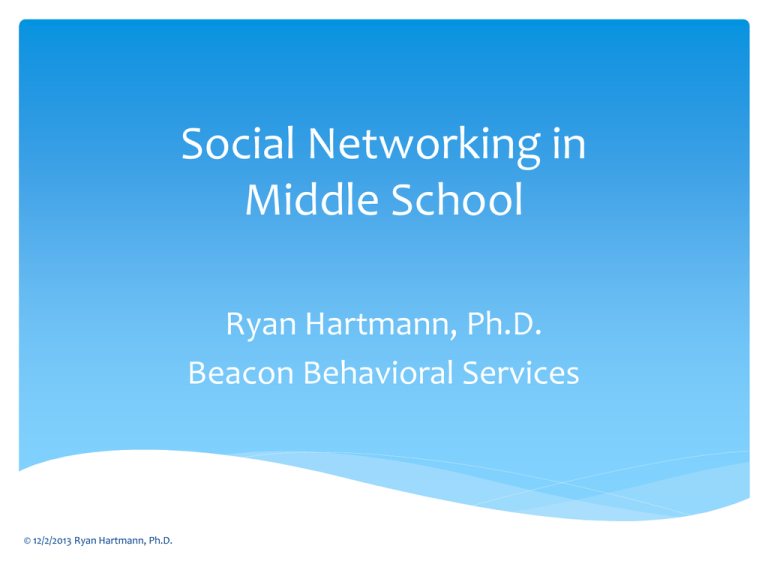
Social Networking in Middle School Ryan Hartmann, Ph.D. Beacon Behavioral Services © 12/2/2013 Ryan Hartmann, Ph.D. Sharing Text, Pictures, and Video Private vs. Public Sharing with a community that does not forget © 12/2/2013 Ryan Hartmann, Ph.D. School Use Some teachers and classes utilize social media Listing of tasks Group discussion Confirm assignments Seek help from classmates © 12/2/2013 Ryan Hartmann, Ph.D. Positive Experiences with Social Media Introduction to socializing for shy children Increased social interaction due to ease Decrease feelings of isolation © 12/2/2013 Ryan Hartmann, Ph.D. Positive Research Findings Virtual Empathy Introverted adolescents learn how to socialize Engage young students in learning (Rosen 2011) Blogging can benefit teens with social anxiety Expressive writing and free expression (Boniel-Nissim & Barak, 2013) © 12/2/2013 Ryan Hartmann, Ph.D. The Evolution of Fail! No record Pictures Video Posted publically Easily shared directly © 12/2/2013 Ryan Hartmann, Ph.D. Distraction Self Discipline Increased homework time with poor performance Checking Facebook associated with lower grades (Rosen 2011) Large waste of time Become obsessed with what is posted Sleep problems © 12/2/2013 Ryan Hartmann, Ph.D. Brain Development Frontal Lobe not fully developed until 20’s Responding impulsively Putting all thoughts online Poor judgment about what is appropriate Safe Respectful Private © 12/2/2013 Ryan Hartmann, Ph.D. Middle School Brain Traps If it is printed, it must be true Belief that classmates will always focus on event Lack of understanding that social media cannot be erased, even if forgotten Actions outside of school can be brought to school © 12/2/2013 Ryan Hartmann, Ph.D. Observed Trends Girls are more concerned with privacy Girls can be more critical or hurtful Grudges can be held much longer for girls vs. boys Boys can be more impulsive © 12/2/2013 Ryan Hartmann, Ph.D. “I’m so much cooler online” Engage in behavior that is not typical in person Desensitized to ruthless behavior Easy to pile on victim with mob mentality Targets of mean behavior are hurt just as easily © 12/2/2013 Ryan Hartmann, Ph.D. Negative Consequences Anxiety over feeling a need to be connected at all times Do not gain the appropriate skills to have interpersonal interactions in the real world More about appearance than the experience Not living in the moment, focused more on sharing it © 12/2/2013 Ryan Hartmann, Ph.D. Research Findings (Rosen 2011) Teens who use Facebook more often show more narcissistic tendencies Overuse of media and technology by children finds them more prone to psychological disorders © 12/2/2013 Ryan Hartmann, Ph.D. Summary of General Concerns Inexperienced with how to handle Social Media Distracting and Time Waster Impulsive and Lack of Understanding Not learning appropriate social skills © 12/2/2013 Ryan Hartmann, Ph.D. More Problematic Activities Cyberbullying or Harassment Cyberstalking Sexting © 12/2/2013 Ryan Hartmann, Ph.D. Research Findings Cyberbullying results in students feeling socially anxious, lonely, sad, frustrated, and helpless (Chung 2011) Worse when anonymous with no rebuttal Victims often become future bullies Mixed research on frequency of cyberbullying Harassed or stalked online experience higher level of stress and trauma than similar events in person (Carll 2011) © 12/2/2013 Ryan Hartmann, Ph.D. Social Media in the Media Today Show story about Tennessee teacher’s picture experiment Thanksgiving day CT Police are investigating Weston High School Cyberbullying arrest in Manchester, CT © 12/2/2013 Ryan Hartmann, Ph.D. Rolling Stone (Burleigh 2013) Sophomore girl committed suicide Sexually assaulted Pictures taken Pictures were shared Middle School Hot List “Bra or No Bra” picture requests © 12/2/2013 Ryan Hartmann, Ph.D. Don’t Despair, You Can Make A Difference Learning opportunity for everyone Parents need to be educated Be involved in child’s life Talk about it early and openly Monitoring programs can be bypassed Passwords? Privacy vs. Safety © 12/2/2013 Ryan Hartmann, Ph.D. How to Navigate Social Media Use in moderation Healthy balance Educate your children and yourself Have proper supervision from parents Be involved © 12/2/2013 Ryan Hartmann, Ph.D. Any Questions? Ryan Hartmann, Ph.D. 860-676-9350 x18 rhartmann@beaconbehavioral.com © 12/2/2013 Ryan Hartmann, Ph.D. References Boniel-Nissim, M. & Barak, A (2013). The therapeutic value of adolescents’ blogging about social-emotional difficulties. Psychological Services, Vol. 10 (3), 333-341. Burleigh, N. (September 26, 2013). Sexting, Shame, & Suicide. Rolling Stone, 1192, 48-55. Carll, E. (2011, August). Electronic harassment and cyberstalking: Intervention, prevention, and public policy. 119th Annual Convention of the American Psychological Association. Lecture conducted from Walter E. Washington Convention Center, Washington, DC. © 12/2/2013 Ryan Hartmann, Ph.D. References Chung, Y. (2011, August). Effect of emotion regulation for cyberbullied adolescents: A structural equation modeling approach. Poster presented at Annual Convention of American Psychological Association in Washington, DC. Rossen, L. (2011, August). Poke me: How social networks can both help and harm our kids. 119th Annual Convention of the American Psychological Association. Lecture conducted from Walter E. Washington Convention Center, Washington, DC. © 12/2/2013 Ryan Hartmann, Ph.D.

